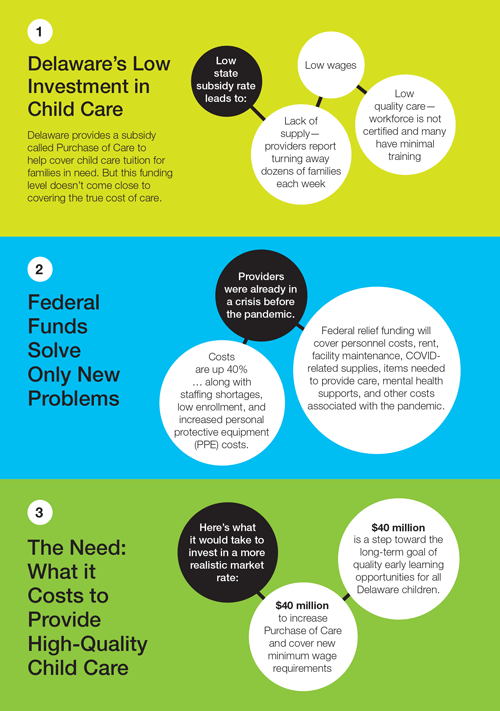Federal Funds for Child Care Will Help, but Not Solve Delaware’s Crisis
– Gov. John Carney announced $120.6 million in funding for early childhood allocated through the American Rescue Plan Act.
-The vast majority of funds will go toward stabilizing an industry in crisis.
-Federal infusions alone will not solve Delaware’s longtime under-investments in early childhood learning.
-However, President Joe Biden’s plan for universal pre-K means it’s time to build now.

ARPA Funding Announced November 1
This week, Gov. John Carney announced $120.6 million in funding for early childhood allocated through the American Rescue Plan Act.
Included in this total are $66 million previously awarded (as required by the Federal Administration for Children and Families (ACF) in the form of Child Care Stabilization Grants. Child Care providers have already spent the vast majority of those dollars to reimburse spring and early summer expenses wrought by the pandemic, including increased staffing, PPE, substitutes, and smaller group sizes.
ARPA investments in child care announced on Monday include:
- $24 million in additional stabilization grants, which represents an immediate infusion for a struggling industry
- $10.6 million in direct financial relief for Delaware child care workers, to support recruitment and retention bonuses
Another $10.6 million has been allocated to establish an Early Childhood Innovation Center at Delaware State University aimed at bolstering the child care workforce through a a statewide scholarship and support model, including peer cohorts, career advising, and scholarship partnerships across higher education institutions. Most child care workers hold a high school degree; while future requirements will likely require postsecondary degrees (as recommended by experts like the Institute of Medicine).
The remaining funds will go to state-level infrastructure and system building (details were not released by the state).
These one time, federal investments come at a time when advocates are pushing for increased state investments in the child care industry, and parents are struggling to find care for their children. They are also aligned with the Delaware Early Childhood Council’s July recommendations, which included input from child care providers, service providers, parents, and council members.
Current State
While federal injections certainly help stabilize the industry and one-time, pandemic-induced increased costs, much more needs to be done, especially for an industry that has lost one in six workers since the onset of the pandemic, and whose high-skill workers earn minimum wage (currently the average is below the new requirements at $10-11 per hour) with no benefits.
- Workforce: In October, ACF issued a memo indicating ”child care staff hiring is more challenging than ever” and “urg[ing] states, communities, and local programs to take bold action now to invest ARP funds and other sources of COVID-19 relief funding to address the current ECE workforce shortage this fall and beyond.”
- State investment: The state reimbursement rate for child care pays only about 50 percent of providers’ current costs. Delaware’s pre-K offering is ranked 39th of all states in providing funding for children in poverty.
- Access: The state child care subsidy only covers 10,000 children under 12 (about eight percent or 1/5 who are eligible). And Delaware ranks 42nd among all states in terms of access to state funded pre-K.
Advocates and community leaders are pushing for the state to invest $55 million in the FY23 Budget: $40 million in child care and $15 million in pre-K.
Share your support for this commitment with the governor and your legislator.
Long-Term Vision and Opportunity
Delaware and the nation are re-thinking early learning as a public good—an approach seen in the U.S. when children turn five in public education. But nations like Denmark, for example, invest in care for toddlers at a rate more than three times higher than the U.S.
That could change soon. President Joe Biden has put forward a proposal to prepare the U.S. for:
- Universal pre-K for all three-and four-year olds, serving 19,400 more children in Delaware
- Broad expansion of child care that will cover costs of quality care, pay living wages to staff on par with K-12 educators, and cover families up to 250 percent median income; in Delaware this will benefit 53,000 families
While Congress has not yet approved this proposal and federal guidance on implementation is not expected for several months, states will have to commit a funding match, and infrastructure investments will be needed to reach the expansive program outlined in the federal proposal. For Delaware, this will mean investments in:
- Early learning workforce—including living wages and benefits for staff—at parity with K-12 educators
- Higher standards for the workforce—including associate degrees and bachelor’s degrees for teachers
- Facilities—today, Delaware doesn’t fund the buildings in which child care operates
As we watch the congressional process and federal guidance play out, Delaware’s foundation must be built—this is the biggest investment in families and young children in generations, and Delaware has an opportunity to build the comprehensive system we need.
Related Topics: america rescue plan act, arpa, daycare, delaware early learning, early childhood, early learning, early learning workforce, federal stimulus, governor john carney
